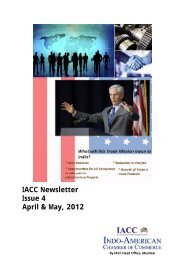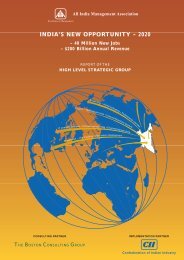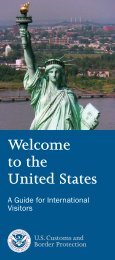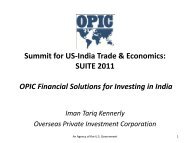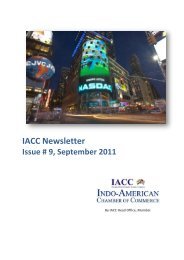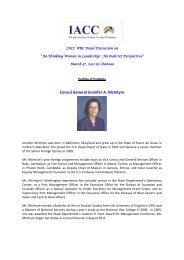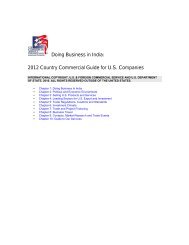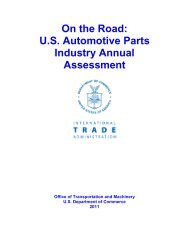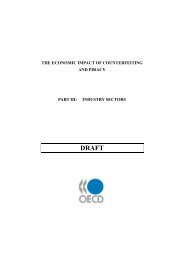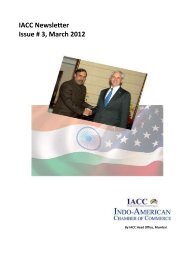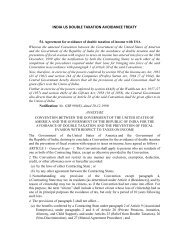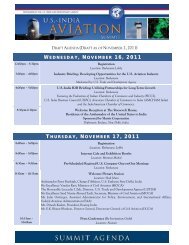Importing into the United States - Indo-American Chamber Of ...
Importing into the United States - Indo-American Chamber Of ...
Importing into the United States - Indo-American Chamber Of ...
You also want an ePaper? Increase the reach of your titles
YUMPU automatically turns print PDFs into web optimized ePapers that Google loves.
Egypt and certain o<strong>the</strong>r countries have<br />
accepted <strong>the</strong> ATA convention but have not<br />
implemented <strong>the</strong> use of carnets. As countries<br />
are being continuously added to <strong>the</strong> carnet<br />
system, please check with <strong>the</strong> U.S. Council if a<br />
country you wish to visit is not included in <strong>the</strong><br />
above list.<br />
16. THE NORTH AMERICAN FREE TRADE<br />
AGREEMENT (NAFTA)<br />
The provisions of <strong>the</strong> North <strong>American</strong><br />
Free Trade Agreement were adopted by <strong>the</strong><br />
<strong>United</strong> <strong>States</strong> with enactment of <strong>the</strong> North<br />
<strong>American</strong> Free Trade Agreement Implementation<br />
Act of 1993 (107 Stat. 2057, Public Law<br />
103-182). Nineteen CFR Parts 10, 12, 123, 134,<br />
162, 174, 177, and 178 were amended and new<br />
parts 102 and 181 of <strong>the</strong> Customs Regulations<br />
were developed to implement <strong>the</strong> duty provisions<br />
of <strong>the</strong> NAFTA.<br />
The NAFTA eliminates tariffs on most<br />
goods originating in Canada, Mexico, and <strong>the</strong><br />
<strong>United</strong> <strong>States</strong> over a maximum transition period<br />
of 15 years. Under <strong>the</strong> schedule to eliminate<br />
duties previously established in <strong>the</strong><br />
Canada-<strong>United</strong> <strong>States</strong> Free Trade Agreement,<br />
goods originating in Canada have been free of<br />
duty since 1998. For most Mexico-<strong>United</strong> <strong>States</strong><br />
and Canada-Mexico trade, <strong>the</strong> NAFTA will<br />
ei<strong>the</strong>r eliminate existing customs duties immediately<br />
or phase <strong>the</strong>m out in five to ten years. On a<br />
few sensitive items, <strong>the</strong> Agreement will phase<br />
out tariffs over 15 years. NAFTA-member countries<br />
may agree to a faster phaseout of tariffs on<br />
any goods.<br />
During <strong>the</strong> transition period, rates of<br />
duties will vary depending upon which<br />
NAFTA country <strong>the</strong> goods were produced in.<br />
That is, <strong>the</strong> NAFTA may grant Canadian goods<br />
entering <strong>the</strong> <strong>United</strong> <strong>States</strong> a different NAFTA<br />
rate than <strong>the</strong> same Mexican goods entering <strong>the</strong><br />
<strong>United</strong> <strong>States</strong>. For most goods imported <strong>into</strong><br />
Canada, <strong>the</strong>re will be three NAFTA rates; <strong>the</strong><br />
rate depends on whe<strong>the</strong>r <strong>the</strong> goods are of U.S.<br />
origin, Mexican origin or produced jointly with<br />
U.S. and Mexican inputs.<br />
Generally, tariffs will only be eliminated<br />
on goods that “originate” as defined in Article<br />
401 of <strong>the</strong> NAFTA. That is, transshipping goods<br />
made in ano<strong>the</strong>r country through Mexico or<br />
Canada will not entitle <strong>the</strong>m to preferential<br />
NAFTA rates of duty. The NAFTA does provide<br />
for reduced duties on some goods of Canada,<br />
Mexico, and <strong>the</strong> <strong>United</strong> <strong>States</strong> that do not originate<br />
<strong>the</strong>re but that meet specified conditions<br />
outlined in <strong>the</strong> Agreement. The NAFTA grants<br />
benefits to a variety of goods that “originate”<br />
in <strong>the</strong> region.<br />
“Originating” is a term used to describe<br />
those goods that meet <strong>the</strong> requirements of<br />
Article 401 of <strong>the</strong> Agreement. Article 401 of <strong>the</strong><br />
Agreement defines “originating” in four ways:<br />
■<br />
■<br />
■<br />
Goods wholly obtained or produced<br />
entirely in <strong>the</strong> NAFTA region;<br />
Goods produced entirely in <strong>the</strong> NAFTA<br />
region exclusively from originating materials;<br />
Goods meeting a specific Annex 401 origin<br />
rule;<br />
■ Unassembled goods and goods classified<br />
with <strong>the</strong>ir parts which do not meet <strong>the</strong><br />
Annex 401 rule of origin but contain 60<br />
percent regional value content using <strong>the</strong><br />
transaction method (50 percent using <strong>the</strong><br />
net cost method.)<br />
Goods that qualify as originating will lose<br />
that status if <strong>the</strong>y subsequently undergo any<br />
operation outside <strong>the</strong> NAFTA region o<strong>the</strong>r than<br />
unloading, reloading, or any o<strong>the</strong>r operation<br />
necessary to preserve <strong>the</strong>m in good condition<br />
or to transport <strong>the</strong> goods to Canada, Mexico or<br />
<strong>the</strong> <strong>United</strong> <strong>States</strong>.<br />
ENTRY PROCEDURES<br />
Existing entry procedures will continue to<br />
be used under <strong>the</strong> NAFTA. As with o<strong>the</strong>r<br />
IMPORTING INTO THE UNITED STATES<br />
33



